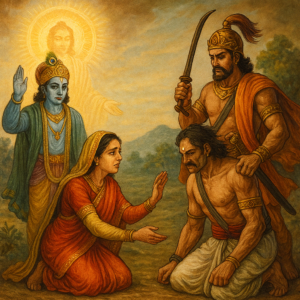In a world dominated by the hustle for power, wealth, and validation, have you ever paused to wonder: What happens when wisdom refuses to compromise? What does it mean to walk away from toxic situations in pursuit of a higher truth?
Picture this—corporate boardrooms brimming with cutthroat competition, families fractured by unspoken resentment, or friendships tainted by betrayal. These are scenes many of us can relate to. But what if I told you that an ancient tale, narrated thousands of years ago, holds the key to navigating these very dilemmas today?
Step into the era of Hastinapur, where politics and greed collided, leaving virtue hanging by a thread. At its heart lies Vidura—the embodiment of wisdom and integrity—whose courage to speak truth to power ultimately led him on a transformative journey. This story is not just about kings and courtiers, but about the choices we face in our own lives: Do we cling to what’s comfortable, even if it’s corrupt? Or do we choose the path of righteousness, no matter how uncertain it seems?
As Vidura meets Uddhava, a confidant of the divine Lord Krishna, the story takes a poignant turn. Their conversation transcends time, unraveling eternal truths about devotion, humility, and the fleeting nature of worldly pursuits. And the best part, these teachings are not just philosophical musings—they are deeply relevant to modern life.
In the serene atmosphere, Maharishi Sukhdevji’s narration to King Parikshit, a profound tale unfolds—a tale of wisdom, devotion, and the eternal truths that transcend time. The meeting between Vidura and Uddhava is not merely an exchange of words but a convergence of spiritual inquiry and divine realization.
The Conflict in Hastinapur
The story begins amidst the chaos of Hastinapur. Duryodhana, intoxicated by power and greed, had unjustly won the kingdom of Yudhishthira in a deceitful game of dice. The humiliation of Draupadi in the Kaurava court, where she was dragged and insulted, marked the nadir of righteousness. Her tears became a silent prayer for divine intervention, a plea that would eventually reshape the fate of Bharatvarsha.
Then, Yudhishthira, the noble Pandava king, was unjustly banished to the forest by Duryodhana, he bore his exile with patience and grace. But when the years of exile ended, and he returned to claim his rightful share of the kingdom, as agreed upon, Duryodhana, consumed by greed and arrogance, refused to honor his word.
In this moment of great injustice, Yudhishthira turned to the supreme diplomat, Lord Shri Krishna, to mediate peace. As Shree Krishna entered the Kaurava court as the messenger of the Pandavas, his words carried the weight of wisdom and the promise of harmony. To the virtuous souls like Bhishma, his message was like nectar—sweet, meaningful, and profound. But the wicked hearts, led by Duryodhana, were deaf to his counsel, blinded by their avarice and pride.
True to his nature, Shree Krishna did not accept the opulence and hospitality of Duryodhana’s palace, where greed and deceit resided. Instead, he chose to stay in the humble yet pious home of Vidura, a man of wisdom and devotion, who welcomed him with pure love and simplicity. Without even the need for an invitation, Shree Krishna found solace in Viduraji’s home, a place where dharma thrived, reminding all that the Lord dwells not in grandeur but where sincerity and righteousness prevail.
Vidura, the wisest among the Kauravas and a man of unwavering integrity, repeatedly warned King Dhritarashtra about the consequences of supporting Duryodhana’s arrogance. He urged the blind king to abandon his blind love for his son and embrace dharma. Vidura’s advice, known as Vidura Niti, remains a treasure trove of ethical principles even today.
However, blinded by his attachment, Dhritarashtra ignored Viduraji’s counsel. Duryodhana, enraged by Viduraji’s truthfulness, insulted him in the royal court and ordered his expulsion. With a calm heart and deep understanding of the transient nature of worldly affairs, Viduraji laid down his bow at the palace gates and left Hastinapur, embarking on a pilgrimage to seek divine refuge and inner peace.
Vidurji’s Pilgrimage
Vidurji’s journey was not merely physical but deeply spiritual. He wandered through sacred lands, visited holy rivers, forests, and mountains, immersing himself in the divine essence present in nature. His heart sought solace, not in worldly riches or power, but in the eternal presence of Shri Krishna, the Supreme Being.
As he travelled, Viduraji heard about the destruction of the Kauravas, a consequence of their adharma. The Mahabharata war had ended, and Maharaj Yudhishthira now ruled a unified Bharat, guided by Shri Krishna’s grace.
The Meeting with Uddhava
Eventually, Vidurji reached the banks of the Yamuna, where he encountered Uddhava, the dearest devotee and confidant of Lord Krishna. Uddhavaji, renowned for his wisdom and devotion, had served Shri Krishna closely and was deeply immersed in the Lord’s divine presence.
When Vidurji asked about Shri Krishna’s well being, Uddhavji was overwhelmed with emotions. Remembering the Lord’s playful lilas, his heart swelled with devotion, and tears flowed from his eyes. For a long time, Uddhava was unable to speak, lost in the memories of Shri Krishna’s divine love and grace.
Shri Krishna’s Reflection on Uddhavaji
Uddhavaji, overcome with emotion, spoke to Viduraji with a heart weighed down by memories of Shri Krishna:
“Vidura ji, with the setting of the sun that was Shri Krishna, the serpent of time has swallowed the homes of the Yadavas and left us destitute. What well-being can I speak of now? These men are deeply unfortunate, and among them, the Yaduvanshis are the most so. Though they lived in constant proximity to Shri Krishna, the refuge of the entire universe, they failed to truly recognize Him. They, who were intelligent, merely regarded Him as the greatest among their clan. Even Shishupala and others, deluded by the Lord’s divine Maya, could not disturb the boundless wisdom of that supreme soul with their spiteful words.
The Lord, in His compassion, revealed His captivating form to all, yet now He has hidden it from us. The people of Braj, especially, were bound to Him by their very souls. When He laughed, joked, and glanced lovingly at them, they would abandon their tasks and stand motionless, their eyes fixed on Him. Such was His charm that their hearts were no longer their own.
When the asuras created havoc, and the burden on the earth became unbearable, the Lord, though unborn and eternal, descended in the Yaduvanshi clan with Balarama ji. Performing the leela of birth in Vasudevaji’s home, He was taken to Braj in fear of Kansa. There, He spent His childhood in divine play, charming all who beheld Him. How remarkable it is that He, the giver of fearlessness, appeared to fear a human tyrant like Kansa!
In Braj, Shri Krishna lived a hidden yet extraordinary life. Alongside Balarama ji, He grazed cows in the groves of the Yamuna, where birds sang amidst lush greenery. To delight the people of Braj, He performed countless playful leelas. As a child, He cried, laughed, and captivated His companions. As He grew older, His flute enchanted not only His friends but the entire land.
When Kansa sent terrifying demons to kill Him, Krishna defeated them effortlessly, as though they were mere toys. He subdued Kaliya Naga, reviving the Gopas and cows poisoned by the Yamuna’s waters. To bless Braj with abundance, He initiated the Govardhan Puja through Nanda Baba and humbly performed the Yagya. When Indra, blinded by pride, unleashed torrential rains to punish Braj, Shri Krishna, in His compassion, lifted Govardhan Mountain as an umbrella to protect the frightened villagers and their cattle.
In the moonlit evenings of Sharad Ritu, the Lord honored the beauty of Vrindavan by playing His flute, drawing the Gopis into His divine Ras Leela. Their hearts were completely surrendered, and in His presence, they experienced the ultimate bliss of devotion.
Even in His humility, Shri Krishna’s divinity shone. When He bowed to Vasudeva ji and Devaki Mata and said, ‘Forgive me for being unable to serve you as a son due to my fear of Kansa,’ His words revealed the depth of His leela and left an indelible impression on our hearts. Vidura ji, the thought of such moments fills me with unbearable longing.
He who bore the burden of the earth’s suffering, who granted liberation to Shishupala during the Rajasuya Yajna, who made requests to Ugrasena Maharaj with humility despite being the Lord of the universe – remembering such leelas, Vidura ji, leaves my heart restless. Truly, there is none like Him, and none can ever fill the void left by His departure.”
How can anyone bear His separation? Even the asuras, who opposed Him, were blessed by their constant contemplation of Him, albeit through enmity. When they beheld Him in battle, riding Garuda, wielding the Sudarshan Chakra, their minds were fixed on Him alone, and they attained liberation. Such is His grace that even those who sought to harm Him were purified by His presence. Uddhava’s voice faltered, his heart heavy with longing, as the memories of Shri Krishna’s divine presence overwhelmed him.
Vidura’s Enlightenment
Listening to Uddhava, Vidura felt a deep sense of fulfillment. He realized that Shri Krishna’s leelas were not mere stories but profound lessons on surrender, devotion, and the eternal truth that the Divine resides in every heart. Vidura’s heart, once burdened by the sorrows of Hastinapur, was now lightened by the nectar of Shri Krishna’s love and grace.
Closing Thought
Just as Vidura left behind the palace of adharma to seek truth, we too can walk away from negativity and toxic environments, choosing a path of inner peace and self-realization. Shri Krishna’s lilas remind us that life’s challenges are opportunities for growth and that the Divine is always present, guiding us through the storms of life.
In a world that often prioritizes wealth and power over righteousness, the story of Vidura and Uddhava is a beacon of hope. It reminds us that true fulfillment lies not in worldly achievements but in aligning our hearts with the eternal truth. As Uddhava said, even the enemies of Shri Krishna attained liberation by thinking of Him constantly. Similarly, in our lives, even struggles and adversities can become pathways to spiritual growth when we surrender to the Divine.
Let us, like Vidura, seek the company of the wise and the divine, and like Uddhava, immerse ourselves in devotion, for it is through such pursuits that we find lasting peace and joy.



